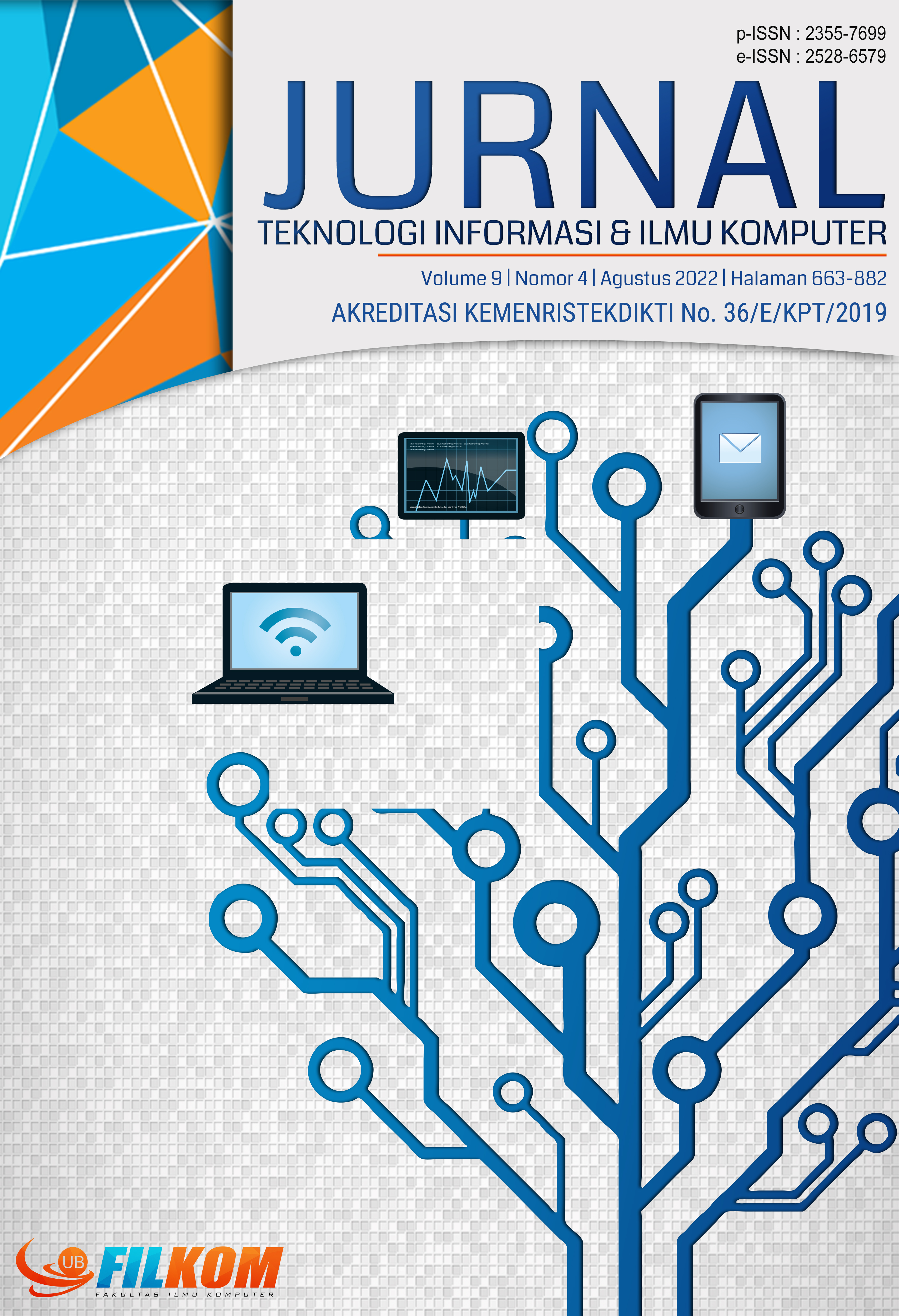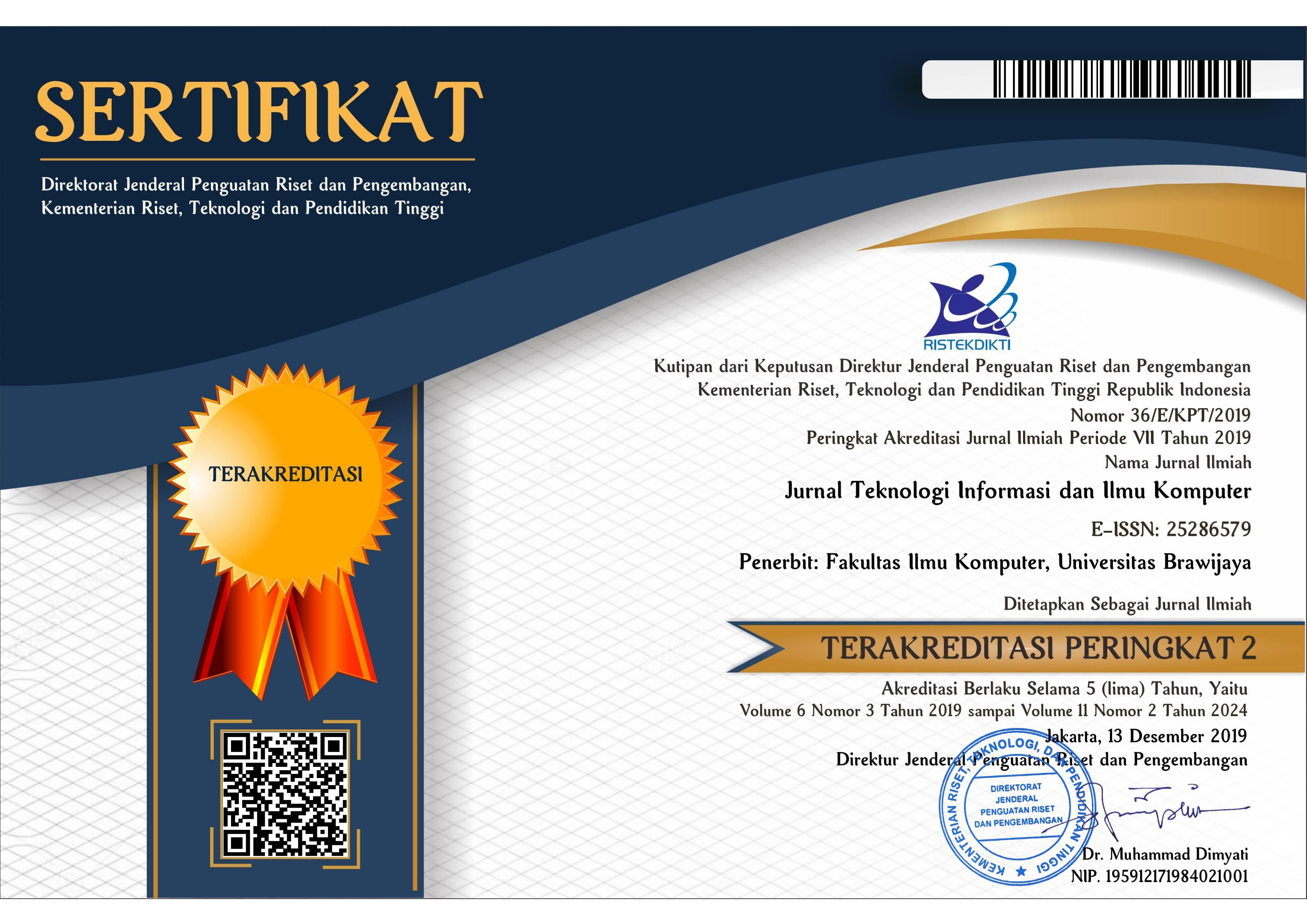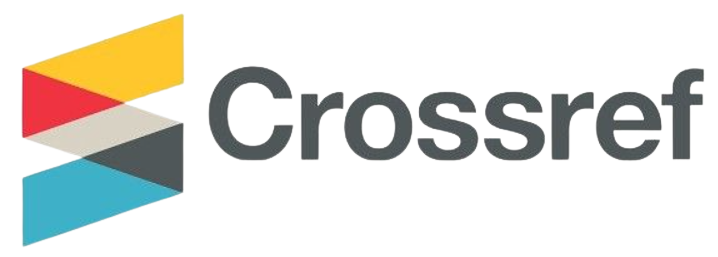Pendekatan Model ADDIE dan Framework MDA pada Gamifikasi Edukasi Pendidikan Seks Anak Usia Dini
DOI:
https://doi.org/10.25126/jtiik.2022944848Abstrak
Tujuan dari penelitian ini adalah melakukan edukasi mengenai pendidikan seks pada anak pada usia dini sesuai dengan kategori umur yang ditentukan oleh WHO. Pendekatan gamifikasi digunakan dalam penyampaian informasi dikarenakan menunjukkan grafik positif dalam memotivasi meningkatkan lingkungan belajar yang positif. Kontribusi penelitian ini dengan mengembangangkan aplikasi gamifikasi untuk edukasi pendidikan seks dilakukan dengan menggunakan model ADDIE dikombinasikan dengan pendekatan elemen-elemen pada framework MDA (Mechanics, Dynamics and Aesthetics). Tahapan-tahapannya dimulai dengan praproses potensi masalah, analysis, design, development, implementation, dan evaluation yang akhirnya akan menjadi final model setelah dilakukan uji respon pengguna terhadap aplikasi yang dikembangkan. Sedangkan fokus elemen pada framework MDA yang digunakan diantaranya elemen mechanics meliputi; genre,goal, platform, rating, level, dan concept art, elemen dynamic meliputi; storyline, game controls, challenge, dan game rules, sedangkan elemen aesthetics meliputi; sensation, narrative, dan submission. Aplikasi game ini juga telah diujicobakan ke 45 user dengan hasil dari uji respon pengguna dari pengguna game dengan hasil persentase 89% (Sangat Baik).
Abstract
The aim of this study is to educate children about sex education at an early age according to the age category determined by WHO. The gamification approach is used in delivering information because it shows a positive graphic in motivating to improve a positive learning environment. The contribution of this study by developing gamification applications for sex education education is carried out using the ADDIE model combined with the approach to elements of the MDA framework (Mechanics, Dynamics and Aesthetics). The stages begin with a preprocessing of potential problems, analysis, design, development, implementation, and evaluation which will eventually become the final model after testing the user response to the developed application. While the focus elements on the MDA framework used include mechanics elements including; genre, goal, platform, rating, level, and concept art, dynamic elements include; storyline, game controls, challenges, and game rules, while aesthetics elements include; sensation, narrative, and submission. User responses are carried out to find out that the application of gamification of sex education education in early childhood is empirically tested and measured at all stages of development in the ADDIE and MDA models. This game application has also been tested on 45 users by using the ideal score (criteria) which is used to calculate the rating scale or interval score and the total number of answers. The percentage result is 89% (Very Good).
Downloads
Referensi
ANGELIA, F. & SUHARJITO. 2019. Improving english learning through game using 6-11 MDA framework. Proceedings of 2019 International Conference on Information and Communication Technology and Systems, ICTS 2019. doi: 10.1109/ICTS.2019.8850951.
BARATA, G. et al. 2015. Gamification for smarter learning: tales from the trenches. Smart Learning Environments. doi: 10.1186/s40561-015-0017-8.
CAHYADI, R. A. H. 2019. Pengembangan Bahan Ajar Berbasis Addie Model. Halaqa: Islamic Education Journal. doi: 10.21070/halaqa.v3i1.2124.
CHANDRA-MOULI, V., CAMACHO, A. V. & MICHAUD, P. A. 2013. WHO guidelines on preventing early pregnancy and poor reproductive outcomes among adolescents in developing countries. Journal of Adolescent Health. doi: 10.1016/j.jadohealth.2013.03.002.
CHAUHAN, J., TANEJA, S. & GOEL, A. 2016. Enhancing MOOC with Augmented Reality, Adaptive Learning and Gamification. Proceedings of the 2015 IEEE 3rd International Conference on MOOCs, Innovation and Technology in Education, MITE 2015. doi: 10.1109/MITE.2015.7375343.
EPPMANN, R., BEKK, M. & KLEIN, K. (2018) ‘Gameful Experience in Gamification: Construction and Validation of a Gameful Experience Scale [GAMEX]’, Journal of Interactive Marketing. doi: 10.1016/j.intmar.2018.03.002.
HAMARI, J., KOIVISTO, J. & SARSA, H. 2014. Does gamification work? - A literature review of empirical studies on gamification. Proceedings of the Annual Hawaii International Conference on System Sciences. doi: 10.1109/HICSS.2014.377.
HARMS, J. et al. 2014. Gamification of online surveys: Conceptual foundations and a design process based on the MDA framework. Proceedings of the NordiCHI 2014: The 8th Nordic Conference on Human-Computer Interaction: Fun, Fast, Foundational. doi: 10.1145/2639189.2639230.
KURT, S. 2017. ADDIE Model: Instructional Design, Frameworks & Theories.
KURT, S. 2018. ADDIE Model: Instructional Design,” in Educational Technology’, Educational Technology.
LANDERS, R. N. et al. 2019. Defining gameful experience as a psychological state caused by gameplay: Replacing the term “Gamefulness” with three distinct constructs. International Journal of Human Computer Studies. doi: 10.1016/j.ijhcs.2018.08.003.
MARTÍNEZ, D. C. & GARCÍA, J. J. R. 2019. Using Malone’s theoretical model on gamification for designing educational rubrics. Informatics. doi: 10.3390/informatics6010009.
MORA, A. et al. 2015. A Literature Review of Gamification Design Frameworks. VS-Games 2015 - 7th International Conference on Games and Virtual Worlds for Serious Applications. doi: 10.1109/VS-GAMES.2015.7295760.
MORSCHHEUSER, B. et al. 2017. How to Gamify? A Method For Designing Gamification. Proceedings of the 50th Hawaii International Conference on System Sciences (2017). doi: 10.24251/hicss.2017.155.
MORSCHHEUSER, B. et al. 2018. How to design gamification? A method for engineering gamified software’, Information and Software Technology. doi: 10.1016/j.infsof.2017.10.015.
PEDROSO, T. et al. 2018. Learning scorecard gamification: Application of the MDA framework | Gamificação do learning scorecard: Aplicação da framework MDA. Atas da Conferencia da Associacao Portuguesa de Sistemas de Informacao.
RATNASARI, R. F. & ALIAS, M. 2016. Pentingnya Pendidikan Seks untuk Anak Usia Dini’, Jurnal Tarbawi Khatulistiwa.
DA ROCHA SEIXAS, L., GOMES, A. S. & DE MELO FILHO, I. J. 2016. Effectiveness of gamification in the engagement of students. Computers in Human Behavior. doi: 10.1016/j.chb.2015.11.021.
SOLIHIN. 2015. Pendidikan Seks Untuk Anak Usia Dini (Studi Kasus di TK Bina Anaprasa Melati Jakarta Pusat. JURNAL JPSD (Jurnal Pendidikan Sekolah Dasar).
STAPA, M. A. & MOHAMMAD, N. 2019. The Use of Addie Model for Designing Blended Learning Application at Vocational Colleges in Malaysia. Asia-Pacific Journal of Information Technology & Multimedia. doi: 10.17576/apjitm-2019-0801-05.
SUBHASH, S. & CUDNEY, E. A. 2018. Gamified learning in higher education: A systematic review of the literature. Computers in Human Behavior. doi: 10.1016/j.chb.2018.05.028.
TAUFIK, A. et al. 2019. Parental Perspectives on the Excellence of Computer Learning Media in Early Childhood Education. JPUD - Jurnal Pendidikan Usia Dini. doi: 10.21009/jpud.132.11.
WIDYASTUTI, E. & SUSIANA. 2019. Using the ADDIE model to develop learning material for actuarial mathematics. Journal of Physics: Conference Series. doi: 10.1088/1742-6596/1188/1/012052.
Unduhan
Diterbitkan
Terbitan
Bagian
Lisensi

Artikel ini berlisensi Creative Common Attribution-ShareAlike 4.0 International (CC BY-SA 4.0)
Penulis yang menerbitkan di jurnal ini menyetujui ketentuan berikut:
- Penulis menyimpan hak cipta dan memberikan jurnal hak penerbitan pertama naskah secara simultan dengan lisensi di bawah Creative Common Attribution-ShareAlike 4.0 International (CC BY-SA 4.0) yang mengizinkan orang lain untuk berbagi pekerjaan dengan sebuah pernyataan kepenulisan pekerjaan dan penerbitan awal di jurnal ini.
- Penulis bisa memasukkan ke dalam penyusunan kontraktual tambahan terpisah untuk distribusi non ekslusif versi kaya terbitan jurnal (contoh: mempostingnya ke repositori institusional atau menerbitkannya dalam sebuah buku), dengan pengakuan penerbitan awalnya di jurnal ini.
- Penulis diizinkan dan didorong untuk mem-posting karya mereka online (contoh: di repositori institusional atau di website mereka) sebelum dan selama proses penyerahan, karena dapat mengarahkan ke pertukaran produktif, seperti halnya sitiran yang lebih awal dan lebih hebat dari karya yang diterbitkan. (Lihat Efek Akses Terbuka).















